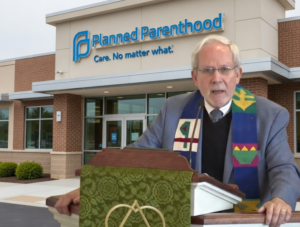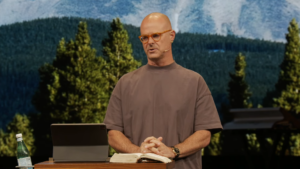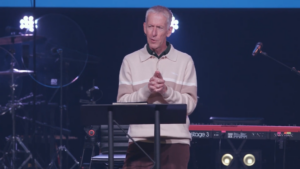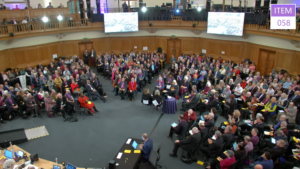In the aftermath of Charlie Kirk’s assassination, evangelical beneficiaries of the late Tim Keller’s winsome approach to Christian societal engagement have put out an all-hands-on-deck call to protect the intellectual and spiritual fiefdom known as third-wayism from being torn down by Kirk-inspired pew-sitters. Fresh off of watching a brother martyred as much for his direct and literal method of engagement as the particulars of his theology, these regular Christians are waking up to the reality that their DMin-branded betters have long been promoting a brand of Christian engagement foreign to the biblical, honest, and direct engagement that Charlie Kirk so brilliantly embodied – a brand whose core tenets are actually barely-veiled Marxist humanism rather than biblical Christianity.
Faced with the threat of being dragged down from their digital ivory towers or pulpits into the arena of vulgar politics where they will be forced to reach conclusive (therefore divisive) positions on the “dinner table,” real-world issues facing their followers, the winsome Evangelical Intelligentsia, represented by Gospel Coalition-aligned pastors like J.D. Greear, authors like Neil Shenvi, and YouTubers like Gavin Ortlund, have predictably retreated from the bailey of untethered world-pleasing to the motte of tone-policed over-spiritualization and deconstructivist epistemology. The combination of these frameworks has historically proven a reliable defense against the wiles of the plain-spoken simpletons who haunt Big Eva’s X feeds and write for discernment websites, as the feminization of evangelical culture has continued to provide the requisite stream of female followers (of both genders) easily lulled by soft-spoken appeals to “concern” and gentle “listening.”
Yet the murder of a young, plain-spoken polemicist in front of our eyes has brought a new challenge to the Christian ideological ecosystem, and particularly to the institutionalists who cry “gospel!” in order to offer endless deference to the pet sins of the lost while dismissing fellow Christians who insist that the fruit of gospel is seen in public obedience to Christ: Why do the enemies of Jesus target the Charlie Kirks, but leave the Russell Moores and JD Greears alone?
What “Third-Wayism” Is
In practice, third-wayism follows a predictable formula:
- Label two opposing “sides” of a contentious issue—political, cultural, or theological—as “left” and “right.”
- Note (often correctly) that neither side is flawless.
- Conclude that the truth must therefore lie “somewhere in between.”
- Refuse to define where that “between” actually is, instead declaring that the refusal itself constitutes wisdom or gospel faithfulness.
The result is a style of reasoning that can be applied indefinitely to any topic, generating infinite gradations of “balance.” Because the “extremes” are always defined subjectively, the supposed middle is infinitely elastic. The process yields not synthesis but epistemological pulverization—the fragmentation of conviction into an endless series of provisional half-positions.
Epistemological Pulverization
This self-protective, platform-protecting method inevitably destroys the possibility of objective truth. When virtue is defined as permanent openness to further parsing, no conclusion can ever be confessed without apology. Every statement must remain suspended between alternatives. The outcome is an evangelicalism fluent in qualification but mute in declaration.
In “The Dilemma of Critical Dilemma,” we critiqued J.D. Greear-pastored Neil Shenvi’s attempt to articulate a “critical but not critical-theory” framework that exemplifies the same collapse: by seeking to affirm biblical authority while preserving the endless self-critique of post-modernism, his system abandons the very finality that revelation requires. Now, in his October 22, 2025, article “Should We Hold a Funeral for the ‘Third Way’?”, Shenvi performs the “third way about the third way,” reprising the same pattern on third-wayism that he used on critical theory in his 2023 book:
- Affirm a critique — “Third-wayism can blur moral asymmetry.”
- Qualify it — “But the impulse behind it is understandable.”
- Neutralize it — “Therefore, we shouldn’t dismiss it outright.”
Shenvi names valid critiques of third-wayism (its blurring of moral asymmetries, its gateway to ambiguity) yet affirms the underlying impulse and declines to state a determinate alternative. The result is once again suspension rather than settlement — the very structure of third-way epistemology disguised as critique.
What both works reveal is not inconsistent application but consistent epistemology: theology that speaks Christian language while remaining captive to post-modern doubt and attractive to spiritual seekers looking for plausible deniability for retaining their sin. In this way, third-wayism becomes not merely a variant of cultural engagement, but a mode of knowing—one that refuses definitive positions as a pathological expression of “faithful” Christian witness.
Similarly, J.D. Greear’s recent essay “Faithfulness amid the Culture War” (and the book it was written to promote) illustrates how third-way epistemology continues to drive the purpose-driven evangelical center even while its language seems to reject it. Greear opens by asking, “Many wonder if the days of a non-partisan approach to Christian cultural engagement are over,” as if this is categorically bad. He acknowledges that some now view Charlie Kirk’s blunt style as evangelistically effective for “a lot of young men,” and even concedes that faithfulness cannot be reduced to mere neutrality, writing, “Faithfulness to Jesus’s mission isn’t less than boldness in the culture war; it’s much more” (by “more,” he means “other”).
Yet the epistemological reflex remains unchanged. Having granted the need for courage, Greear immediately cautions pastors not to let their pulpits (from which Greear himself – similar to SBC Executive Committee President Jeff Iorg’s “eternal mission” – saves people) become “vehicles for partisan allegiance.” He thus frames the preacher’s task as a tension between gospel clarity and political caution without allowing revelation-driven application to resolve it. The result is a familiar pattern: affirmation followed by qualification, conviction balanced by disclaimer. Rinse and repeat until nobody has any idea what to do. In short, his proposed “faithfulness” still inhabits the logic of the third way: truth may be confessed, but only under perpetual moderation.
Greear’s rhetoric, therefore, exemplifies epistemological pulverization—the breaking of moral clarity into competing half-claims. Even when he calls for courage, it is a courage of calibration, a posture that measures witness by tone rather than truth. Far from signaling a movement away from third-wayism, Greear’s recast represents its latest iteration: a reformulated vocabulary of “faithfulness” that keeps the structure of indefinite moderation intact.
The Leftist and Postmodern Inheritance
Although marketed as theological balance, third-wayism is an identifiably postmodern, left-leaning, and humanist project. Its suspicion of certainty, its fixation on tone, and its aversion to moral conclusion come directly from post-1960s intellectual movements that replaced truth with perspective.
1. Postmodern Suspicion
Derrida’s différance—the endless deferral of meaning—was a linguistic insight, but within evangelical discourse it has become a moral one. Meaning, we are told, is always complex; therefore conviction must always be tentative. Much like egalitarian feminism, this apologetic approach imports the postmodern assumption that every claim to truth is a disguised claim to power. The more confidently one speaks, the more oppressive one must be. Conviction becomes cruelty; clarity becomes pride. In all cases, unapologetic certitude risks alienating the very sinners we are trying to reach.
2. Leftist Humanism
Third-wayism also borrows the left’s moral ontology of empathy and inclusion. Its highest good is not obedience to divine revelation but the maintenance of “good-faith” engagement. The unity of the community and the supposed receptiveness of seekers become greater virtues than the clarity of the command. In Marxist-humanist terms, reconciliation replaces righteousness; the dialectic of tension replaces the declaration of truth.
Thus, the third-wayist instinctively prioritizes mediation over proclamation. When Keller describes “Center Church,” or when J.D. Greear urges a “gospel ministry ‘greater’ than culture war” posture, both operate on the same axiom: that avoiding the offense of “thus sayeth the Lord” is itself a missional strategy – and a full circle that arrives back at the attractional church rails that the Kellerite’s Winsome Express rides on.
3. The Drift of the Center
Every claim to a neutral center drifts “leftward” (in a modern ideological sense), because the left’s guiding premise is relativism, and the right’s premise is realism. The left elevates the ever-shifting, undefinable subjectivity of man (and the collective as the application point of truth and justice), while the right elevates objective, revealed truth (and its application point in each individual). Once epistemic openness becomes virtue, the gravitational pull of subjectivity ensures that the “third way” will consistently tilt toward liberal outcomes, even when its advocates protest neutrality.
Gavin Ortlund and the Rhetoric of Balance
Gavin Ortlund’s recent podcasts (defending the third way before Kirk’s murder, then modulating his approach and insisting we don’t discard the third way) illustrate this epistemic structure in evangelical form. He warns against “detached aloofness” and “moral equivalency,” yet still defines the faithful posture as “resisting both extremes” and “letting the Bible set its own table.” The metaphor is revealing: the Bible becomes a site of ongoing arrangement, not a finished meal. The interpreter remains the curator of balance rather than the servant of revelation.
When Ortlund calls Christians to “critique their own tribe,” “retain friendships,” and “resist evils on both sides,” he frames virtue as relational civility rather than theological fidelity – a virtue that just happens to defend his fellow evangelical elites from having to engage in the kind of biblical divisiveness they abhor. His call for perpetual moderation may sound biblical, but it functions as the same kind of rhetorical deconstruction that Shenvi applies epistemologically—a refusal to simply let Scripture speak with finality and discard unbiblical ideas wholesale. The same pattern appears in Keller’s and Greear’s appeals to “winsome witness”: perpetual qualification masquerading as holiness.
The Fear of the Lord as the Antithesis of Postmodern Knowing
Against this culture of ambiguity, Scripture offers a radically different epistemology.
“The fear of the Lord is the beginning of knowledge” (Prov 1:7).
Fear here is not anxiety but submission—an acknowledgment that knowledge begins where autonomy ends. To fear the Lord is to accept the limit of human speculation and the finality of divine revelation.
1. Revelation Is Final
The Word of God does not invite perpetual reinterpretation, nor does it allow for the generously unsettled epistemological engagement of third-wayism. It commands belief and obedience. Postmodern epistemology treats every truth claim as subjective and negotiable; biblical epistemology treats revelation as settled. A truth claim that can always be re-parsed is no longer true. It isn’t even an opinion. It’s nothing but an epistemic black hole.
2. Knowing as Obedience
Scripture equates knowing with obeying: “By this we know that we know Him, if we keep His commandments” (1 John 2:3). Knowledge is covenantal, not speculative. The modern preference for “dialogue” over decision reverses this order. Endless conversation about truth is not humility; it is rebellion in academic dress. Christians state plainly, argue, and repent when corrected. They do not stop at “neither the left nor right is correct” and pat themselves on the back.
3. The Restoration of Integrity
The fear of the Lord ends epistemological pulverization by restoring a fixed point:
“Forever, O Lord, your word is firmly fixed in the heavens” (Ps 119:89).
Truth, for the believer, is not negotiated between extremes; it is received from the God who defines both good and evil. Where the third-wayist builds a theology of deferral, Scripture offers a theology of declaration.
From Winsomeness to Witness
Ideas bear moral fruit. When conviction is dissolved at the level of knowing, courage evaporates at the level of witness. The third-way model replaces proclamation with performance and truth with tone. Its guiding question is not What has God said? But how will this sound? The result is a generation of leaders fluent in apology but hesitant about clarity. Because third-way reasoning treats offense as moral failure, it is naturally self-protective. Theological modesty becomes a social survival tactic. What passes for “gentleness” is often merely the avoidance of reputational cost. When this epistemology shapes the pulpit, the church becomes a curator of dialogue rather than a herald of truth. Sermons major in empathy and minor in doctrine. The church becomes what Paul warned against—a people “ever learning and never able to come to the knowledge of the truth” (2 Tim 3:7).
Prophetic clarity will always appear extreme to an age that worships balance. Elijah, John the Baptist, and Christ Himself would have been denounced as unnuanced. Yet Scripture presents their boldness not as a failure of love but as its fulfillment. Love “rejoices in the truth” (1 Cor 13:6); it does not relativize it. Paul’s resolve—“we have renounced disgraceful, underhanded ways…by the open statement of the truth” (2 Cor 4:2)—exposes the heart of the issue. The church’s task is not to position itself between worldly factions but to announce divine verdicts over them. Those believers who join us in cheering the demise of the failed third way misadventure must not take their foot off the gas until it is driven away for good.
























3 responses to “Death of Third Way and the Hail Mary of Winsome Witness”
This is one of the best articles I’ve ever read on the state of the church in our time. As Paul asked, “So have I become your enemy by telling you the truth?” (Galatians 4:16). Sadly, the answer is often, “yes”. The necessary condition for unity must be the truth.
Amen.
In every way imaginable, people seek to have their “cabin core” of beliefs; they much prefer the comfiness of compromise rather than a parting of the ways. It’s very clear that to be saved, we’re to be Set Apart—to be Called Out Ones—and live accordingly. Jesus said we’re his friends if we do as He commands. Today’s evangelism is to declare all that we’ve ever been taught is fake, and that we’re to believe nothing is real.